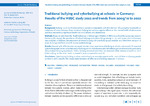Traditional bullying and cyberbullying at schools in Germany: Results of the HBSC study 2022 and trends from 2009/10 to 2022
Fischer, Saskia M.
Bilz, Ludwig
Background: Bullying is a form of violence that is carried out repeatedly, with the intention of causing harm and with an imbalance of power between those involved. Bullying has serious negative effects on the mental health of adolescents and thus represents a significant health risk in childhood and adolescence.
Methods: Based on data from the Health Behaviour in School-aged Children (HBSC) study from the survey year 2022 in Germany (N = 6,475), the prevalence of school bullying and cyberbullying among 11-, 13- and 15-year-olds in Germany was analysed. In addition, the prevalence of school bullying and cyberbullying was analysed as a trend from 2009/10 to 2022 (bullying) and from 2017/18 to 2022 (cyberbullying).
Results: Around 14 % of the learners surveyed reported direct experience of bullying at school, and around 7 % reported cyberbullying experiences as bullied and/or bullying victims. Adolescents who identified as gender diverse were particularly likely to report bullying experiences. School bullying decreased over time, but remained stable between 2017/18 and 2022. Cyberbullying, on the other hand, increased in 2022 compared to 2017/18.
Conclusions: Experiencing bullying at school and online is an everyday experience for many children and young people, so there is still a need for the broad implementation of effective anti-bullying measures in schools.
Files in this item

